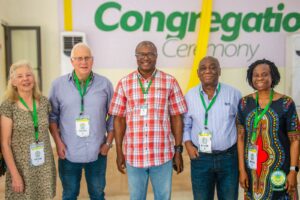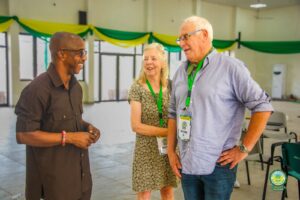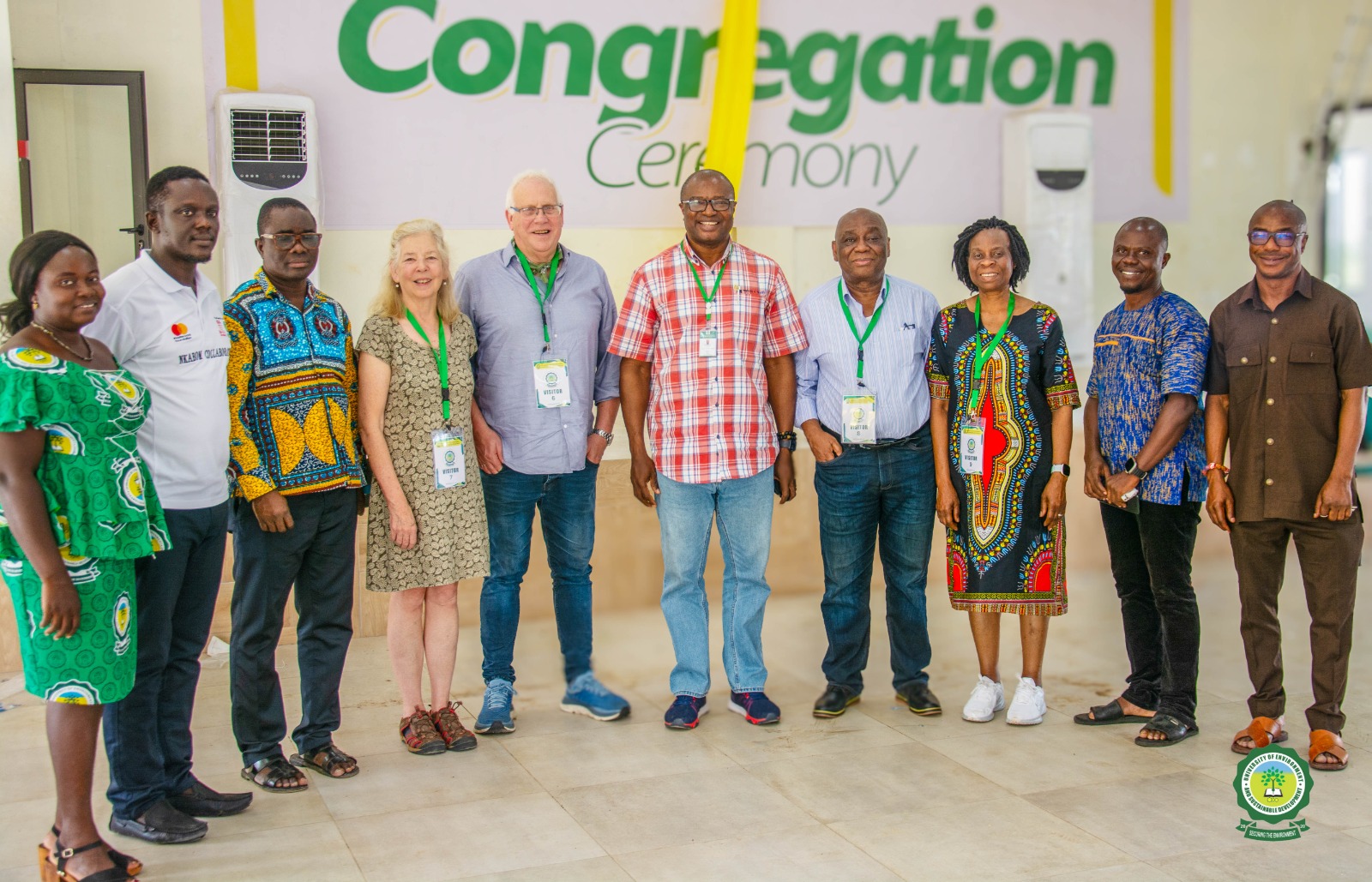A four-member delegation from the University of Greenwich, London, led by Professor Benz Kotzen, has paid a courtesy call on the Vice-Chancellor of the University of Environment and Sustainable Development (UESD) to explore potential collaboration in aquaponics research and sustainable livelihood interventions for farmers affected by climate change.
The visit was facilitated by Dr. Christian Larbi Ayisi, Senior Lecturer at the Department of Water Resources and Aquaculture Management of the School of Natural and Environmental Sciences (SNES).
Prof. Benz Kotzen, an Associate Professor of Landscape Design and a chartered landscape architect with more than 30 years of experience, highlighted the growing importance of aquaponics as an innovative and climate-resilient food production system. He explained that aquaponics—an integration of aquaculture and hydroponics—offers farmers an opportunity to diversify their income while conserving water, reducing environmental impact, and improving food security in communities vulnerable to climate change.
He emphasised that their mission to Ghana was to ascertain the potential for a comprehensive study on aquaponics and how it could be deployed as an alternative livelihood for farmers whose traditional agricultural practices are increasingly threatened by erratic rainfall, rising temperatures, and land degradation.

Prof. Kotzen further underscored the need for strong consideration of fish welfare and overall animal health in developing aquaponics systems. According to him, ensuring optimal conditions for aquatic organisms is critical for sustainable production, higher yields, and the long-term viability of such systems. He also expressed interest in examining how Ghanaian communities can adopt low-cost, efficient aquaponics technologies that suit local conditions.
Adding his voice, Dr. Gideon Onumah, an Agricultural Economist from the Natural Resources Institute of the University of Greenwich, highlighted the economic potential of aquaponics as a tool for rural transformation. He explained that with proper training and market linkages, aquaponics could support not only food production but also entrepreneurship among youth and women, especially since the field is often perceived as male-dominated.
Dr. Onumah stressed the importance of developing value chains, improving access to financing, and ensuring cost-effective production systems. He also indicated the University of Greenwich’s willingness to collaborate on impact assessments, capacity-building, and research that identifies the most economically viable aquaponics models for Ghanaian farmers.
Welcoming the delegation, the Vice-Chancellor, Prof. Eric Nyarko-Sampson, reiterated UESD’s commitment to exploring collaborative opportunities in the aquaculture and aquaponics space.
Prof. Nyarko-Sampson noted the strategic advantage of UESD’s location in the Eastern Region, which contributes approximately 40% of the inland fish production in Ghana. He also emphasized the expertise and enthusiasm of UESD’s young faculty, who are deeply invested in sustainable aquaculture research and innovation.
He briefed the delegation on UESD’s ongoing efforts in aquaculture education, particularly under a major collaboration involving six Ghanaian Universities, McGill University, and the Association of Ghana Industries (AGI). Over the next ten years, UESD aims to train youth in agro-waste processing and aquaculture technologies with a special focus on: Aquaponics, Fish Processing Technology, Fish Feed Processing, Technology and Management, Fish Health and Disease Management and Fish Hatchery and Breeding Technology
The Vice-Chancellor expressed confidence that a partnership with the University of Greenwich would further enhance UESD’s impact in community-based aquaculture development and climate-resilient food systems.

The Pro-Vice-Chancellor, Prof. Edward Wiafe Debrah, also welcomed the proposed partnership, describing aquaponics as an innovative and practical solution to improve livelihoods and support farmers navigating the challenges posed by climate change. He reaffirmed UESD’s openness to international collaborations that advance sustainability, research excellence, and community development.
In attendance were UESD’s aquaculture and fisheries experts — Dr. Joe Aquah, Dr. Eric Kwabena Droepenu, and Mrs. Esther Korlekie Odoi-Darko.
The visiting team also included Ms. Barbara Von Bardewish and Ms. Grace Onumah, both Nursing specialists whose work focuses on community health and wellbeing, key pillars of sustainable rural development.

